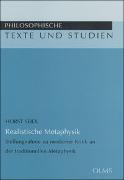Realistische Metaphysik
BücherAngebote / Angebote:
Dem Verfasser, der sich durch seine Arbeiten über seine Ausgaben über und seine Ausgaben zu Aristoteles ein internationales Renommee erworben hat, ist für diese umfassende und prätentionslose Wiedervergegenwärtigung der klassischen Metaphysik zu danken." (Karl-Heinz Nusser, Philosophisches Jahrbuch 114. Jg./2007)
Kants Kritik an der Metaphysik betraf nur die des modernen Rationalismus und hinterließ das ungelöste Problem des "Dinges an sich", d.h. des natürlichen Realismus, in dem wir alltäglich leben und die Außendinge ebenso, wie die Seele, den Geist und Gott als an sich bestehendes Reales anerkennen. Auf ihn stützt sich die traditionelle Metaphysik. Sie ist realistisch und rechtfertigt sich durch die traditionelle Erkenntnistheorie, die auf das Reale als ihre eigene Voraussetzung hinauskommt. Damit löst sich das Ding-an-sich-Problem auf.
Dies war Kant und den ihm nachfolgenden Richtungen nicht mehr bekannt. Sie übten an der traditionellen Metaphysik als naivem Realismus Kritik, rangen aber selber ständig mit dem Ding-an-sich-Problem und einem "kritischen Realismus". Nach dem Idealismus Hegels und der Neukantianer folgten Positivismus, Phänomenologie, Existentialismus, Analytische Philosophie, Kommunikations- und Sprachphilosophie, welche alle den natürlichen Realismus verloren und in ihrer gegenmetaphysischen, kritischen Einstellung mitunter bis zur Selbstaufhebung der Philosophie fortschritten.
Die vorliegende Abhandlung eröffnet, von den Quellentexten her, einen neuen Zugang zur traditionellen Metaphysik und untersucht gegenkritisch die moderne Kritik an ihr und ihren Verlust des natürlichen Realismus.
Kant's critique of metaphysics only applied to the metaphysics of modern rationalism, leaving unsolved the problem of the 'thing in itself', i.e. of the natural realism of our everyday life and in which we also recognise external things such as the soul, the spirit and God as existing in themselves. This is the basis of traditional metaphysics, which is realistic and justified by the traditional theory of knowledge, which, as its own precondition, amounts to what is real. Thus the problem of the 'thing in itself' is solved.
Kant and the movements that came after him no longer recognised this. They criticised traditional metaphysics as naive realism, but themselves struggled constantly with the problem of the thing in itself and with a 'critical realism'. After the idealism of Hegel and the Neo-Kantians came Positivism, Phenomenology, Existentialism, Analytical Philosophy and the philosophies of communication and language, in all of which natural realism was lost, and which, by taking anti-metaphysical, critical positions, sometimes reached the point of a self-annulment of philosophy.
This study, based on original source texts, provides new access to traditional metaphysics and offers a critical counter-examination of the modern critique of metaphysics and its loss of natural realism.
"Dem Verfasser, der sich durch seine Arbeiten über und seine Ausgaben zu Aristoteles ein internationales Renommee erworben hat, ist für diese umfassende und prätentionslose Wiedervergegenwärtigung der Metaphysik zu danken."
(Karl-Heinz Nusser, in: Phil. Jahrbuch, 114. Jahrgang/ II (2007))
Lieferbar in ca. 5-10 Arbeitstagen
